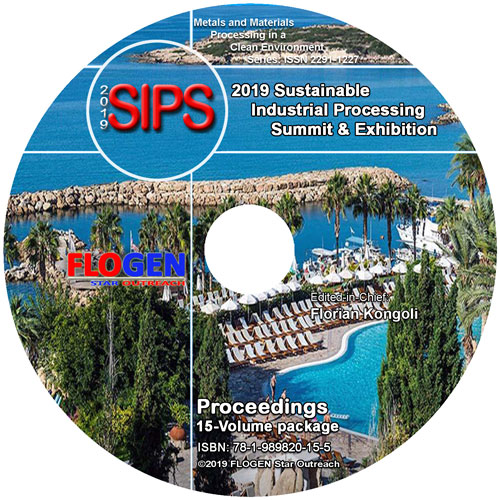2019-Sustainable Industrial Processing Summit
SIPS2019 Volume 11: New and Advanced Materials, Technologies, and Manufacturing
| Editors: | F. Kongoli, F. Marquis, N. Chikhradze, T. Prikhna |
| Publisher: | Flogen Star OUTREACH |
| Publication date: | 20 December 2019 |
| Pages: | 174 pages |
| ISBN: | 978-1-989820-10-0 |
| ISSN: | 2291-1227 (Metals and Materials Processing in a Clean Environment Series) |

CD shopping page
An Efficient Flexible Self-powered System Integrating Organic Solar Cells and Supercapacitors
Ruiyuan Liu1; Masahito Takakuwa2; Kilho Yu2; Zhi Jiang2; Hiroki Kimura2; Shinjiro Umezu3; Kenjiro Fukuda2; Takao Someya2;1CENTER FOR EMERGENT MATTER SCIENCE (CEMS), RIKEN, Wako, Japan; 2CENTER FOR EMERGENT MATTER SCIENCE (CEMS), RIKEN, JAPAN, Wako, Japan; 3WASEDA UNIVERSITY, Tokyo, Japan;
Type of Paper: Invited
Id Paper: 404
Topic: 43
Abstract:
Nontoxic flexible solar cells are by far the best candidates for meeting the ever-growing energy consumption demand of wearable devices, portable electronics, and the Internet of Things, while the output of solar cells is intrinsically restricted by the fluctuation of sunlight from ambient factors such as weather and day-night cycle. Self-powered integrated energy devices consisting of photovoltaic cells and energy storage units can serve as sustainable and portable distributed power sources that simultaneously generate and store electric energy without the need for external charging circuits and wires.
Previously, we have developed ultra-flexible organic photovoltaics (OPVs) with a total thickness of a few micrometers that could realize superior mechanical stretchability and environmental stability (water, heat, light et al.) while maintaining high power conversion efficiency (over 10%). With this ultra-thin OPVs as direct power sources that can be well attached onto objects, we have successfully developed self-powered ultra-flexible electronic devices that can precisely measure biometric signals on skin or other tissues. To further extent the application of such kind of solar cells in wearable electronics, a compatible energy storage units is needed to ensure a stable power supply.
However, the complexity of power management, device compatibility design and materials engineering optimization in the flexible integrated device results in low total conversion and storage efficiency (~2%), large device thickness (~mm) and poor operation stability. In this talk, we will report an efficient, ultra-thin, and flexible self-powered system integrating OPVs with supercapacitors that addresses the above issues. Introducing carbon nanotubes content into conducting polymers along with a chemical treatment yields dramatically increased electrode surface area, decreased charge-transfer resistances, and enhanced mechanical robustness, thus improving the specific capacities of supercapacitors, reducing the device thickness into a few tens of micrometers while maintaining excellent stability. Through the optimization of carbon nanotube-polymer composite electrodes, high total energy conversion and storage efficiency has been achieved in the long-term stable ultra-flexible integrated devices.
Keywords:
Energy efficiency; Nanomaterials; New and advanced materials; New and advanced technology; Renewable energy; storage and use;References:
1. Takao Someya et al. High Operation Stability of Ultraflexible Organic Solar Cells with Ultraviolet-Filtering Substrates. Adv.Mater.2019, 31, 1808033.2. Takao Someya et al. Self-powered ultra-flexible electronics via nanograting-patterned organic photovoltaics. Nature 2018, 561, 516-521.
3. Takao Someya et al.Thermally stable, highly efcient, ultrafexible organic photovoltaics. Proc. Natl Acad. Sci. USA 2018, 115, 4589-4594.
4. Takao Someya et al. Stretchable and waterproof elastomer-coated organic photovoltaics for washable electronic textile applications. Nat. Energy 2017, 2, 780-785.